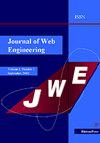Enhancing Security in Low-Power Wide-Area (LPWA) IoT Environments: The Role of HSM, Tamper-Proof Technology, and Quantum Cryptography
IF 1
4区 计算机科学
Q4 COMPUTER SCIENCE, SOFTWARE ENGINEERING
引用次数: 0
Abstract
Low-power wide-area (LPWA) networks are integral to expanding Internet of Things (IoT) applications, offering extensive coverage with low power consumption. However, these networks face significant security challenges due to their widespread deployment and inherent constraints. In order to provide secure services in an LPWA IoT environment, important information stored in IoT devices (encryption keys, device unique numbers, etc.) must be safely protected from external hacking or theft by physical access, and it is necessary to develop tamper-proof technology to enhance physical security. Meanwhile, with so many ruggedized IoT devices processing and transmitting sensitive information, security systems are essential to protect the integrity and privacy of IoT data. This paper explores the critical role of hardware security modules (HSMs), tamper-proof technology, and quantum cryptography in enhancing the physical, network, and data security of LPWA IoT environments. We propose operational strategies for HSMs, tamper-proof technology in ruggedized LPWA IoT settings, and a quantum key distribution (QKD)-based IPsec solution for robust network and data security.增强低功耗广域 (LPWA) 物联网环境的安全性:HSM、防篡改技术和量子密码学的作用
低功耗广域(LPWA)网络是扩展物联网(IoT)应用不可或缺的一部分,它能以低功耗提供广泛的覆盖范围。然而,由于其广泛部署和固有限制,这些网络面临着巨大的安全挑战。为了在 LPWA 物联网环境中提供安全服务,必须安全地保护存储在物联网设备中的重要信息(加密密钥、设备唯一号码等),防止外部黑客攻击或通过物理访问窃取,因此有必要开发防篡改技术来增强物理安全性。同时,由于有如此多的加固型物联网设备在处理和传输敏感信息,因此安全系统对于保护物联网数据的完整性和隐私性至关重要。本文探讨了硬件安全模块(HSM)、防篡改技术和量子密码学在增强 LPWA 物联网环境的物理、网络和数据安全性方面的关键作用。我们提出了在坚固耐用的 LPWA 物联网环境中使用 HSM、防篡改技术的操作策略,以及基于量子密钥分发(QKD)的 IPsec 解决方案,以实现稳健的网络和数据安全。
本文章由计算机程序翻译,如有差异,请以英文原文为准。
求助全文
约1分钟内获得全文
求助全文
来源期刊

Journal of Web Engineering
工程技术-计算机:理论方法
CiteScore
1.80
自引率
12.50%
发文量
62
审稿时长
9 months
期刊介绍:
The World Wide Web and its associated technologies have become a major implementation and delivery platform for a large variety of applications, ranging from simple institutional information Web sites to sophisticated supply-chain management systems, financial applications, e-government, distance learning, and entertainment, among others. Such applications, in addition to their intrinsic functionality, also exhibit the more complex behavior of distributed applications.
 求助内容:
求助内容: 应助结果提醒方式:
应助结果提醒方式:


